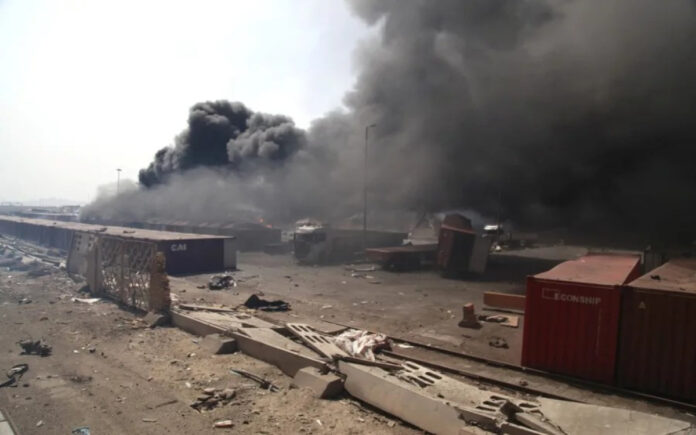Tehran: A powerful explosion, likely triggered by chemical materials, claimed the lives of at least eight people and injured more than 700 others at Iran’s largest port, Bandar Abbas, according to Iranian state media reports.
The blast, which rocked the Shahid Rajaee terminal of the port, unfolded as Iran engaged in a third round of nuclear negotiations with the United States in Oman. However, there was no evidence to suggest a connection between the two events.
Hossein Zafari, spokesperson for Iran’s crisis management organization, pointed to improper storage of chemicals as the probable cause of the disaster.
“The cause of the explosion was the chemicals inside the containers,” Zafari told Iran’s ILNA news agency.
“Previously, the Director General of Crisis Management had given warnings to this port during their visits and had pointed out the possibility of danger,” he added.
Meanwhile, a government spokesperson stated that while chemicals were likely involved, the precise cause had not yet been determined.
President Masoud Pezeshkian ordered an immediate investigation into the incident and dispatched his interior minister to the site. Officials reported that firefighting efforts continued to prevent the blaze from spreading to adjacent areas.
Iranian news channels broadcast dramatic footage showing thick black and orange smoke clouds towering above the port, alongside images of office buildings with doors blown off and debris scattered across the premises.
Shahid Rajaee port, located near the strategic Strait of Hormuz, serves as Iran’s primary container hub, handling the majority of the country’s shipping containers, according to state media.
The explosion shattered windows within several kilometers of the site and was audible on Qeshm Island, located 26 kilometers (16 miles) south of the port, Iranian media reported. The semi-official Tasnim news agency released footage showing injured individuals receiving roadside medical attention amidst chaotic scenes.
State television earlier suggested that poor handling of flammable materials was a “contributing factor” to the explosion. A local crisis management official told state TV that the blast occurred after several containers stored at the port ignited.
In the aftermath, port customs officials confirmed that truck evacuations were underway, and that the affected container yard likely housed “dangerous goods and chemicals.” Activities at the port were temporarily halted, authorities said.
Also Read: South Korea Eyes Trade Talks with the US, Emphasizing Caution and Vigilance
Pattern of Deadly Incidents
Saturday’s blast adds to a series of fatal accidents that have plagued Iran’s energy and industrial sectors in recent years, many of which have been attributed to negligence.
These incidents include refinery fires, a gas explosion at a coal mine, and a 2023 emergency repair accident at Bandar Abbas that resulted in the death of one worker.
While negligence has often been cited, Tehran has also accused its adversary, Israel, of orchestrating certain attacks, particularly targeting Iran’s nuclear infrastructure. In February 2024, Iran blamed Israel for an attack on its gas pipelines. Additionally, a 2020 cyberattack that disrupted computers at Shahid Rajaee port was reported by The Washington Post as likely retaliation by Israel for an earlier Iranian cyberattack.
Israel has expressed apprehension regarding the U.S.-Iran nuclear talks, demanding the complete dismantlement of Iran’s nuclear capabilities. Tehran maintains that its nuclear program is strictly for peaceful purposes, although international watchdogs warn that Iran is moving closer to weapons capability.
Also Read: Pakistan Eyes $1.4B Boost in Currency Swap Line with China for Economic Stability
Israeli officials, including Prime Minister Benjamin Netanyahu’s office and the military, have not responded to inquiries about any potential involvement in Saturday’s explosion.
Iranian authorities emphasized that the country’s oil facilities were unaffected by the incident.
The National Iranian Petroleum Refining and Distribution Company issued a statement clarifying that the blast had “no connection to refineries, fuel tanks, distribution complexes and oil pipelines.”



